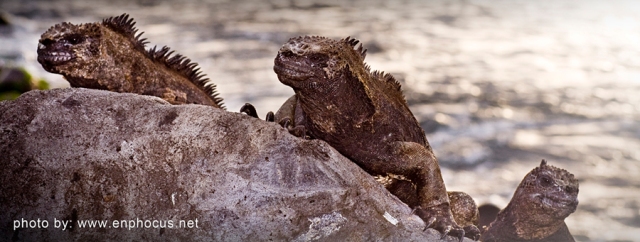From 3 September through 21 September, 2014 a multinational team of marine biologists, veterinary health professionals, and Park Nacional Galápagos (PNG) wildlife officers conducted thorough health assessments of three endemic species on five different islands in the Galápagos archipelago. Led by University of North Carolina (UNC) affiliated North Carolina State University (NCSU) veterinarian Gregory Lewbart and University of San Francisco Quito (USFQ)/Galápagos Science Center (GSC) biologist Maximilian Hirschfeld, along with Juanpablo Muñoz (USFQ/GSC), Diego Páez-Rosas (USFQ/GSC) and veterinarian Diane Deresienski (UNC/NCSU), and under the supervision of PNG official Maryuri Irlandia Yépez Revelo, the team of over a dozen individuals safely captured, sampled, and quickly released 112 marine iguanas, 30 Galápagos sea lions, five hawksbill turtles, and one green turtle on the islands of San Cristóbal, Isla Lobos, Española, Santa Cruz, and Isabela.
This work is part of an ongoing and expanding collaborative effort initiated by UNC Professor Kenneth Lohmann, with the support and cooperation of the PNG, to establish baseline health parameters that can be readily measured and recorded in the field and laboratory. Such work is important as these animals are vulnerable to multiple threats including natural (e.g. El Niño events) and anthropogenic threats like human waste runoff, general pollution, and commercial disasters like oil spills.
A rich and dynamic reservoir of information and publications should translate to conservation benefits to these species, and perhaps others, in the archipelago.
Gregory A. Lewbart, 25 September, 2014
photos by: www.enphocus.net






